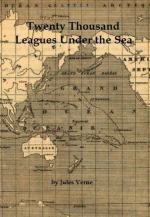
|
| Name: _________________________ | Period: ___________________ |
This test consists of 5 short answer questions, 10 short essay questions, and 1 (of 3) essay topics.
Short Answer Questions
1. What does Aronnax say he sees traveling in the Nautilus?
2. What animal does Ned harpoon along the Arabian coast?
3. What is the first strange thing Aronnax observes about Nemo's behavior.
4. What do they observe coming from the Ganges River?
5. Why does Aronnax have trouble falling asleep after the rescue?
Short Essay Questions
1. Explain the difference Nemo sees in the encounters with the Scotia and the Abraham Lincoln.
2. Describe why Ned interrupts Aronnax's reading and what he shows him.
3. What are some of the fantastic ideas about the monster and how does it captivate the public?
4. Describe the men's first view of the undersea world.
5. Tell about the first thing Captain Nemo allows Aronnax to see on the Nautilus.
6. Briefly detail the problem with the telescope.
7. Describe the amusing fowl they see on the island of Gilboa.
8. Why is Aronnax concerned about the savages and what does Nemo do about it?
9. Relate Aronnax's encounter with the strange man.
10. What does Aronnax observe that explains Nemo's vast wealth?
Essay Topics
Write an essay for ONE of the following topics:
Essay Topic 1
Write a critique of TWENTY THOUSAND LEAGUES UNDER THE SEA. Mention the story line, the interest, the anti-war message, the incredible predictions, the use of dialog, poetic language, and any other technical aspects of the novel. End by making a recommendation to readers who have not already read the novel.
Essay Topic 2
Write an essay on the comparison of a book to a movie adaptation. After watching the movie, Twenty Thousand Leagues Under the Sea, evaluate how closely the film version adheres to the novel. Include reasons that screenplays are limited in what they can depict on the screen.
Essay Topic 3
Write an essay on the importance of imagination for writing science fiction. Base your essay on the fact that Jules Verne was writing in the 19th century about scientific ideas that have been achieved remarkably similar to his imaginative novels of his day.
|
This section contains 838 words (approx. 3 pages at 300 words per page) |

|




